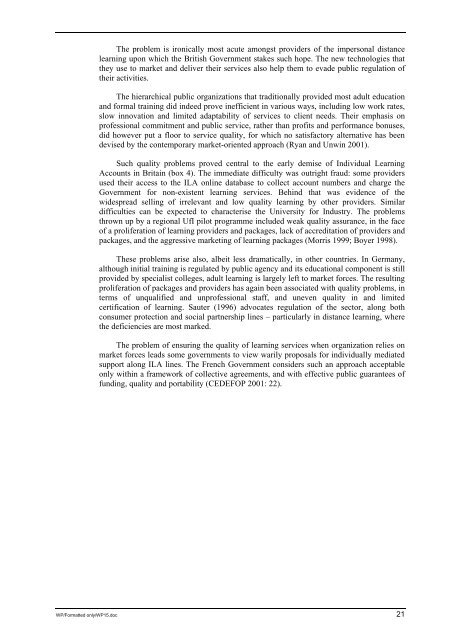Lifelong learning - International Labour Organization
Lifelong learning - International Labour Organization
Lifelong learning - International Labour Organization
Create successful ePaper yourself
Turn your PDF publications into a flip-book with our unique Google optimized e-Paper software.
The problem is ironically most acute amongst providers of the impersonal distance<br />
<strong>learning</strong> upon which the British Government stakes such hope. The new technologies that<br />
they use to market and deliver their services also help them to evade public regulation of<br />
their activities.<br />
The hierarchical public organizations that traditionally provided most adult education<br />
and formal training did indeed prove inefficient in various ways, including low work rates,<br />
slow innovation and limited adaptability of services to client needs. Their emphasis on<br />
professional commitment and public service, rather than profits and performance bonuses,<br />
did however put a floor to service quality, for which no satisfactory alternative has been<br />
devised by the contemporary market-oriented approach (Ryan and Unwin 2001).<br />
Such quality problems proved central to the early demise of Individual Learning<br />
Accounts in Britain (box 4). The immediate difficulty was outright fraud: some providers<br />
used their access to the ILA online database to collect account numbers and charge the<br />
Government for non-existent <strong>learning</strong> services. Behind that was evidence of the<br />
widespread selling of irrelevant and low quality <strong>learning</strong> by other providers. Similar<br />
difficulties can be expected to characterise the University for Industry. The problems<br />
thrown up by a regional UfI pilot programme included weak quality assurance, in the face<br />
of a proliferation of <strong>learning</strong> providers and packages, lack of accreditation of providers and<br />
packages, and the aggressive marketing of <strong>learning</strong> packages (Morris 1999; Boyer 1998).<br />
These problems arise also, albeit less dramatically, in other countries. In Germany,<br />
although initial training is regulated by public agency and its educational component is still<br />
provided by specialist colleges, adult <strong>learning</strong> is largely left to market forces. The resulting<br />
proliferation of packages and providers has again been associated with quality problems, in<br />
terms of unqualified and unprofessional staff, and uneven quality in and limited<br />
certification of <strong>learning</strong>. Sauter (1996) advocates regulation of the sector, along both<br />
consumer protection and social partnership lines – particularly in distance <strong>learning</strong>, where<br />
the deficiencies are most marked.<br />
The problem of ensuring the quality of <strong>learning</strong> services when organization relies on<br />
market forces leads some governments to view warily proposals for individually mediated<br />
support along ILA lines. The French Government considers such an approach acceptable<br />
only within a framework of collective agreements, and with effective public guarantees of<br />
funding, quality and portability (CEDEFOP 2001: 22).<br />
WP/Formatted only/WP15.doc 21

















